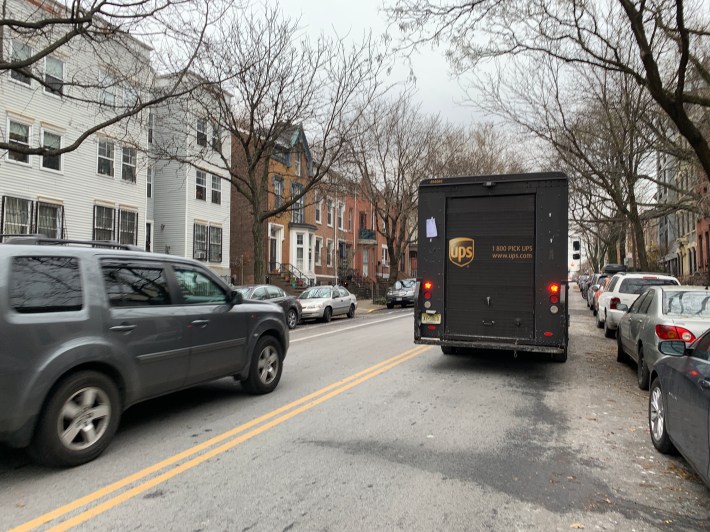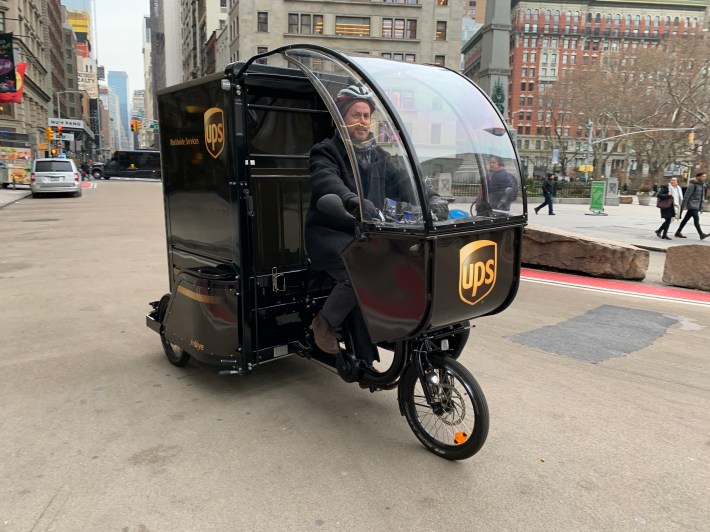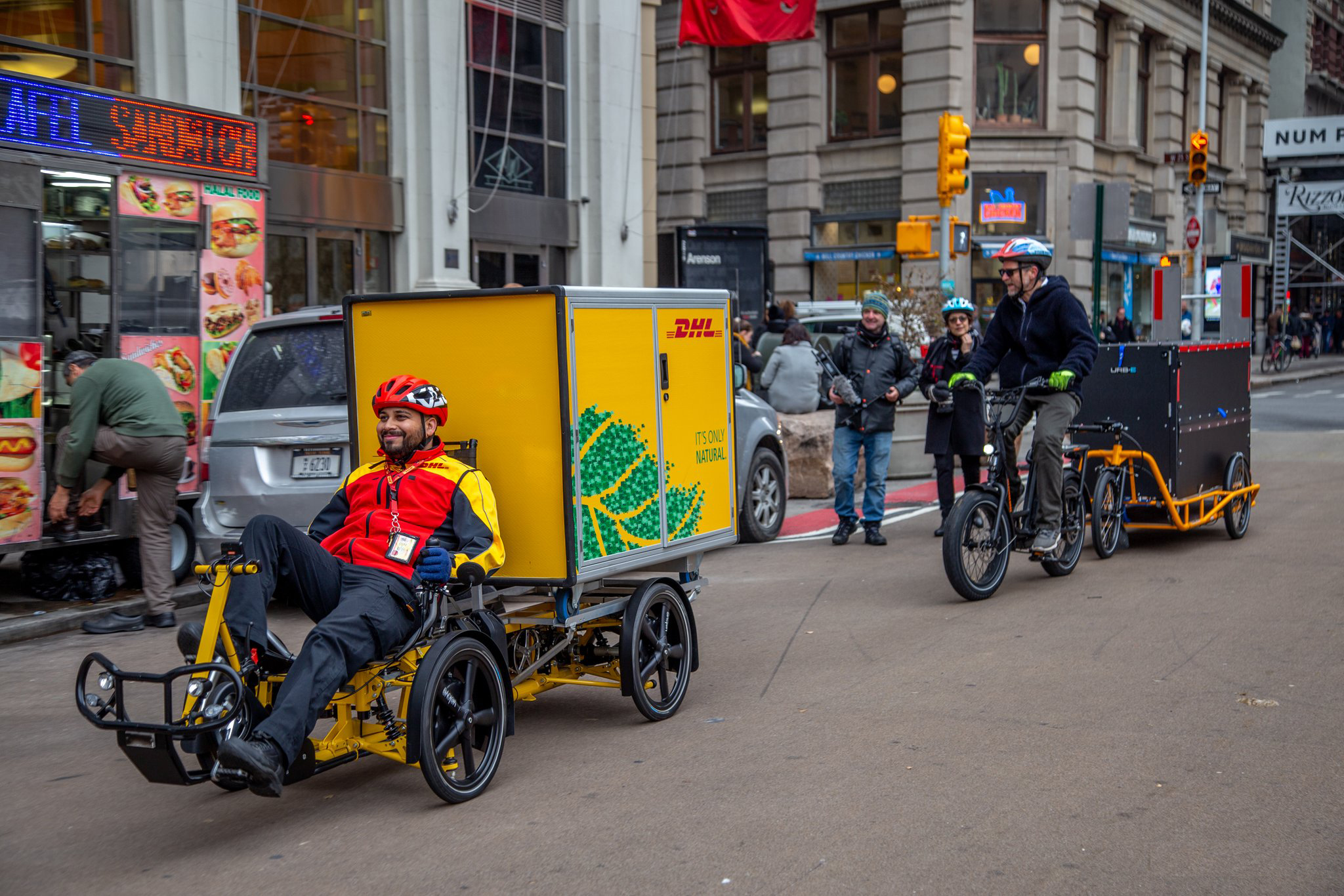
The city's collaboration with delivery companies to use cargo bikes instead of behemoth trucks is an absolute good in a city mired in congestion, pollution and carnage.
The idea that companies such as UPS, DHL and Amazon could deliver packages via bicycles rather than trucks is as important a development as online retailing itself.
Except there's one small thing that's bothering us: the size of the much-hyped cargo bike program. That's the small thing.
City officials gathered on Wednesday near the Flatiron Building to cheer a six-month pilot that will allow the companies — and others that might want to join — to deploy electric-assist cargo bikes across Manhattan below 60th Street. But details were incredibly thin, two major players were AWOL, and the program itself seems to comprise just five new cargo bikes joining the 90 that Amazon claims it has already been operating without fanfare for months.
First, the good news: The program may be starting small, but the potential is enormous. More than 1.5 million packages are delivered in the city every day — most by truckers, whose vehicles cause a disproportionate amount of congestion because most of the deliveries occur during the day. And trucks are frequently left illegally parked or double-parked, adding to the congestion, thanks to a city program that reduces parking fines for hundreds of companies if they agree not to fight the tickets in court. Deliveries by fully-loaded cargo bikes capable of easily transporting 300 pounds of goods can reduce the numbers of trucks on our roads.
Other details emerged: the bikes will be capped at 12 miles per hour and will be legal to operate in roadways and in bike lanes. Companies will be able to load and unload the bikes — not for hours, but for a few minutes — without feeding meters, which will encourage their use. Bikes can not be stored in public at the end of the day.
All of these rules are the result of negotiation with industry players, coalescing into a pilot program that can be implemented without the usual round of begging community boards filled with people terrified of bikes, but oddly unable to see 10,000-pound trucks speeding through red lights.
Many European and Asian cities reduce congestion through cargo bikes, yet New York remained on the sidelines for years, even as online retailing (combined into a perfect storm with the unrelated rise of Uber and Lyft) made our streets unlivable.

"We really need to catch up here in New York," Department of Transportation Commissioner Polly Trottenberg told reporters.
Catch up? Drop, meet bucket. UPS alone delivers more than 413,000 packages in the city each day with 6,400 trucks, the company said. Its plans call for two — as in "one plus one equals..." — cargo bikes making daily runs out of the company's West Side headquarters. In other words, the company will still be basically operating 6,400 trucks a day in New York City.
DHL will deploy three cargo bikes. That's pretty much the same math: Thousands of trucks will remain. And truck drivers have been responsible for half of the deaths of cyclists this year. A few cargo bikes won't change that math any time soon, either.
What else was missing from Wednesday's announcement? A lot. For example:
Where was FedEx and the Postal Service?
No discussion of reducing congestion and willful disregard of traffic laws is complete without taking on Big Package: FedEx and the United States Postal Service, which are responsible for hundreds of thousands of packages delivered every day.
Neither company so much as sent a representative to Wednesday's announcement. Then again, neither has a cargo bike program (though FedEx said hope springs eternal).
"FedEx is investing in multiple innovative and sustainable solutions, and we look forward to exploring the cargo bike pilot as we continue to work with city and state officials on issues related to New York City traffic congestion," said the company's global spokeswoman Maury Donahue, saying basically nothing.
Meanwhile, the USPS — which does not have to worry about congestion in the city, as it does not pay parking tickets thanks to its federal status — said it would "review" the program, but only "to the extent that it facilitates the federal mandate to deliver mail efficiently and effectively to every address."
Spokesman Xavier Hernandez said the Postal Service had "no record of being invited to attend this event."
That sounded like a snub. But the DOT snubbed right back.
"Amazon, DHL, and UPS had all purchased or explored purchasing cargo bike models on their own, and had discussed these initiatives with us from an early stage," said DOT spokesman Brian Zumhagen, adding that any company can participate if it wants. "We would be happy to have further conversations with USPS."
For now, it appears that neither company is ready to make any big changes, as Council Member Brad Lander showed in a tweet from Wednesday afternoon:
This is W 52nd St right now. @FedEx is blocking the sidewalk, bike-lane, and street as though they own at all.
— Brad Lander (@bradlander) December 4, 2019
And why not? We enforce nothing here. @NYC_DOT @NYPDTransport why are we complacent chumps?!
Time to follow Paris’ lead and start charging:https://t.co/q8MAdTf7sU pic.twitter.com/b1U4gHw5QT
And Streetsblog came across an idling FedEx truck parked illegally on E. 23rd Street as we approached the press conference. We ran the plate and found that this one truck had gotten more than $40,000 in parking tickets since 2016. A bike would never ring up such summonses — and it certainly wouldn't use as much fuel.
Known fines for #NY_62198MJ:
— How's My Driving NY (@HowsMyDrivingNY) December 4, 2019
$41,347.20 | Fined
$4,636.71 | Reduced
$35,575.49 | Paid
$1,135.00 | Outstanding
Cargo bikes are only one piece of the puzzle
Under the pilot, companies agree to run their bikes out of existing facilities and store them there overnight.
But if cargo bikes are truly going to replace trucks, the companies and the city need to determine safe staging areas where a single big truck can park and unload its modular pods — and the cargo-bike-riding workers can load up and head out into the neighborhoods to make the actual deliveries.
No such staging areas are part of the pilot program. Instead, the city said it is hoping that to gather enough trip data — such as cargo bike travel times, routes, common pick-up and drop-off locations, and duration of time spent at the curb — that the program can be expanded with rule changes or street design changes at specific locations.
That was a secret of Seattle's success in its pilot program with UPS. A spokesman for the Department of Transportation in the Emerald City told Streetsblog that UPS paid the city for the equivalent of about three parking spaces so it could bring in a large truck that would then disgorge modular units to the cargo bikes, which would make deliveries in the Pioneer Square neighborhood, where new weight regulations barred most big trucks.
Is this just another UPS vehicle in our bike lanes?

Under the rules of the pilot, the cargo bikes are street legal, albeit at only 12 miles per hour. At that speed, drivers would more likely stick to existing bike lanes, even though they're too wide to pass and would create hazards on a two-way cycle track.
Obviously, Streetsblog wasn't all that excited about the idea of exchanging a UPS truck in our bike lanes for a UPS bike in our bike lanes, but Trottenberg suggested that if more and more commercial vehicles are taking lanes away from cyclists, the city would have a stronger argument for widening bike lanes and removing more lanes from trucks and cars.
"Let's get the pilot started, let's see how it goes. at some point if the delivery fleet turns more and more to bikes, we're going to have to think about what street design accommodations we'll have to make," Trottenberg said.
Why is a pilot program even needed?
One sentence in the city's announcement stood out: "The program’s goal is to better understand whether cargo bicycles can successfully fit into the city’s streetscape." It's an odd construction, given that there was never a program to "better understand" how the city's streetscape would handle trucks making 1.5 million package deliveries (hint: it can't), nor was there a pilot program to "better understand" how Uber and Lyft would transform our city until both vehicular invasions were far past the breaking point.
At various points, Trottenberg made it sound as if the cargo bikes represented some sort of bizarre and possibly problematic invader.
"The shipping companies wanted to make sure they had some agreement with the city about what the regulatory climate would be, where the trucks could load and unload, and ... we had been looking at doing a rule making, but we [decided] it would be smarter to do a pilot first, test it out, see what worked, what didn't work, see where people were happy with the results and not so happy, so when we put the final touches on the program that we hope will grow by hundreds of bikes."
It's just weird to think that companies can deploy tens of thousands of trucks without needing a "regulatory climate," but bikes that could replace them do.
The elephant in the room
The cargo bikes unveiled on Wednesday are pedal-assist electric bikes — more like tricked out e-Citi Bikes than the faster throttle-controlled electric bikes typically used by New York's food delivery workers.
But the new program is clearly a tale of two cities: the NYPD continues to crack down on delivery workers who use throttle-controlled electric bikes, while the city is actively pursuing partnerships with Fortune 500 companies to make deliveries using electric bikes.
The difference, of course, is that pedal-assist bikes are legal under state law and throttle-controlled bikes are not, but the legal distinction only reveals the hypocrisy at the core of the de Blasio administration crackdown.
"Yet again @NYCMayor's gov't is rolling out another #ebike program for corporation while at same time continuing to criminalize immigrant delivery workers for their ebikes," tweeted Do Lee of the Biking Public Project, calling for an end to "de Blasio's tale of two ebikes."
Another champion of delivery workers, Steven Wasserman of the Legal Aid Society, told the Daily News, "While Mayor Bill de Blasio rolls out the red carpet for major delivery companies to use commercial cargo e-bikes, individual delivery workers — largely immigrants and people of color —continue to be over-policed and ticketed for simply doing their jobs."






